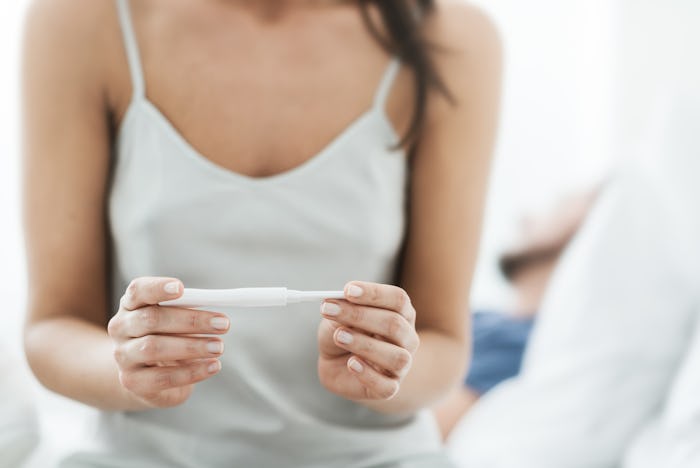Life
Here's When You Should Take A Pregnancy Test For The Most Accurate Result
Waiting on the results of a pregnancy test is about as stressful as it gets, no matter what result you're hoping to see. And even though most pregnancy tests claim to be 99 percent accurate, you and your partner want to be 100 percent sure that you're getting the right results. Which is why before you get ready to pee on that stick, you may be asking yourself, when are pregnancy tests most accurate?
Most home pregnancy tests on the market claim to provide accurate results as early as the first day of a missed period, with some even claiming to be able to give you an answer before your period fails to show. But it may be in your best interest to wait just a little longer, as hard as this may be. Waiting at least one week after your missed period may give you the most accurate result, per WebMD. In addition, performing the test first thing in the morning when urine is more concentrated can also increase the chances that the test will give you the most accurate result. During this time when your anxiety levels are through the roof, you're depending on your pregnancy test to give you some steadfast answers — well, one very important one, at least — and some peace of mind, so you want to optimize your test taking session as much as you can.
So how do these store-bought pregnancy tests even work? Home pregnancy tests work by detecting the presence of the hormone human chorionic gonadotropin (hCG) in a woman's urine, explains Planned Parenthood. HCG enters the bloodstream and urine when the fertilized egg attaches itself to the wall of a woman's uterus. If you are not pregnant, your body will not produce this hormone and your pregnancy test will show up negative.
As Parents mentioned, once the egg has attached to the uterine lining and the placenta forms, a woman's hCG level doubles every 48 to 72 hours. As every step with pregnancy, this also can take a little more time than you wish. This explains why waiting a few days after a missed period will increase the chances that the pregnancy test will detect hCG in the woman's urine and give her results she can rely on. Plus it's not like these tests from the drug store are free so you don't want to be peeing on a stick prematurely, and potentially getting your heart broken only to be taken on an emotional rollercoaster ride a few days later.
But while waiting a few days to take a pregnancy can help produce accurate results, you don't want to wait too long to find out. Once you receive a positive pregnancy test result, it's important to visit your doctor to confirm your home test results and discuss your options for prenatal care. This important step can help ensure you and your baby remain healthy throughout your pregnancy.
In addition to following the package instructions, it is also important to check the test itself to make sure that it hasn't expired. As Parents mentioned, using an expired pregnancy test can produce unreliable results.
Your grandparents may have relied on dreams of fish to determine whether or not they were expecting a new addition, today's women can find tests that will produce the same reliable, accurate results as a doctor's test at their local drug store. Knowing that these days we have the opportunity to get almost any information we want immediately, this might be one instance when it's in your favor to practice a little bit of patience. No matter how desperately you want to see that plus or minus sign, waiting at least one week after your missed period before taking a home pregnancy test can help give you results you can trust. Afterwards, it doesn't hurt to visit your healthcare provider to confirm your findings.
Check out Romper's new video series, Romper's Doula Diaries:
Watch full episodes of Romper's Doula Diaries on Facebook Watch.
